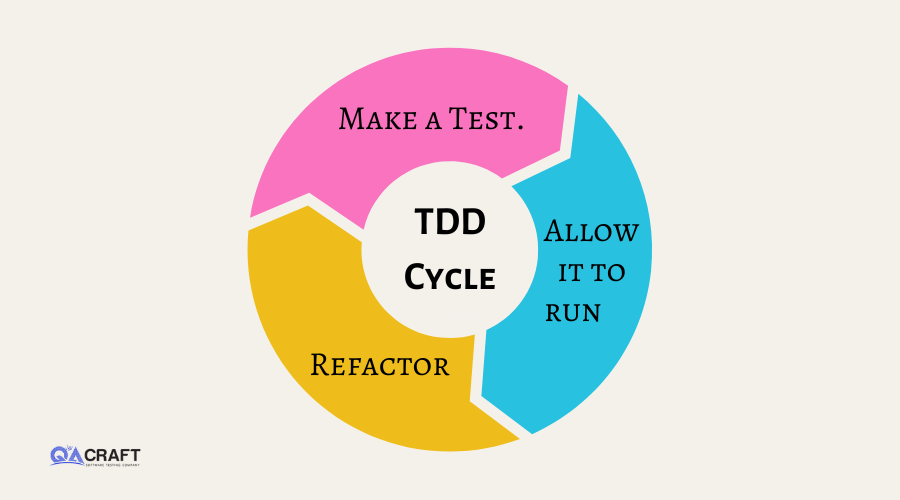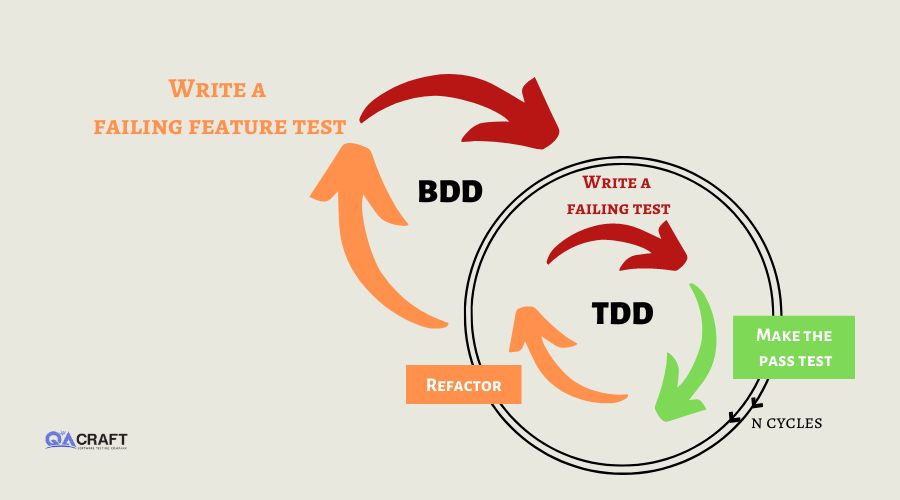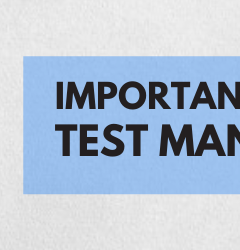30 Aug

Before we start the difference between TDD vs BDD, we should know what is TDD and BDD.
What is TDD?
TDD stands for ‘Test Driven Development. TDD is used for the Software Development process. It works on simple principles like developing and correcting failed test cases before developing new test cases. It helps developers to minimize redundant code. In TDD Team should have knowledge of programming language. Using It team can achieve 100% results.
Process of Conducting TDD Test
- Include a Test: Prepare and include a test
- Run through all of the tests and see if any new ones fail.: check that any of the tests are getting failed.
- Create a program: If the test is getting failed, prepare a new test
- Test your code and refactor it: Prepare tests and make changes according to requirements.
Steps of TDD Cycle
- Make a test.
- Allow it to run.
- Refactoring Is the process of changing the code to make it better.
- Repeat the procedure.

Traditional Testing Vs TDD
| Traditional Testing | TDD |
| It is a traditional method, No mandatory rule is used. | In TDD programming language is used as per the requirement. |
| There is no sequence to follow. | There is one sequence to follow. |
| In Traditional testing, the team cannot proceed further with a known issue. | In TDD team can ‘proceed further with some known issues. |
| It does not provide guarantees for the standard. | It provides guarantees for the standard set for it. |
| 100% test coverage cannot be achieved. Because Traditions testing is not a sequential procedure. | 100% test coverage can achieve. It is a sequential procedure. |
What is BDD?
BDD is a Software Development process, it is derived from TDD. TDD is the foundation level of BDD. Behavior-driven development is a way of communication among the technical team – non-technical team and stakeholders.

So for easy communication simple English language is used to create BDD. BDD is helpful to create strong collaboration between stakeholders and stoke holder. For BDD’s business value and needs, both are important. BDD is very simple to understand for the non-technical person.
Process of BDD
- Write a scenario.
- Run the Scenario.
- Result (Fail/Pass)
Example: Login page with BDD
Using BDD we can create test cases with easy-understanding language.
- Click on the ‘Login ‘link.
- The user provided his/her username and password.
- Enter ‘username’ and ‘password’.
- Click on the login button.
TDD vs BDD – What’s the Difference?
Find the difference between TDD and BDD here:
| TDD | BDD |
| Its abbreviation is ‘Test Driven Development. | Its abbreviation is ‘Behavior Driven Development |
| 1st step is to prepare a test case. | 1st step is to prepare the scenario according to an expected result. |
| The primary task of TDD is to prepare for how the task is implemented. | The primary task of BDD is to check the behavior of an application for the end user. |
| It is written in technical language. | It is written in non-technical (Easily understandable) language. |
| Changes made in application requirements impact more on TDD test cases more. | Functional changes in application requirements do not impact BDD. |
| Communication is required among developers. | Communication is required among the entire teammates. |
| It is used with projects which used API and third-party tools. | It is used with an E-commerce website and application system. |
| Junit, TestNG, and NUnit Support TDD. | SPecFlow, Cucumber, and MSpec support BDD |
| To understand TDD, the programming language is mandatory. | BDD is easy to understand. |
| There are minimum chances to have bugs. | There are maximum chances to have bugs. |
Conclusion:
In this article, we have seen the difference between TDD vs BDD. TDD and BDD both are methodologies to work with projects. They both have their own demerits and merits. So it’s up to the team to decide which methodology they want to use in their projects.
Read Also:
I am Priyanka Kantharia. I am working as a Software Test Engineer at QACraft. My Qualification is MCA. I have 2 years of working experience as a QA. My hobbies are watching movies, and listening music.
Related Post
Recent Posts
Categories
- Agile Testing
- Android App Testing
- Automation Testing
- Banking Domain Testing
- Beta Testing
- cloud testing
- Corporate Life
- cross browser testing
- Cypress Testing
- desktop testing
- Domain Testing
- E-commerce Website Testing
- E-learning App Testing
- Functional Testing
- Game Testing
- Healthcare Domain Testing
- Infographics
- Ios App Testing
- Jenkins
- JIRA
- Katalon
- Manual Testing
- Mobile App Testing
- monkey testing
- Performance Testing
- Salesforce Testing
- security testing
- Selenium
- Software Testing
- static testing
- Test Environments
- vdfv
- Web Application Testing
© Copyright 2024 QACraft Pvt. Ltd. All rights reserved.
Contact : +91 9157786796



Priyanka Kanthariya